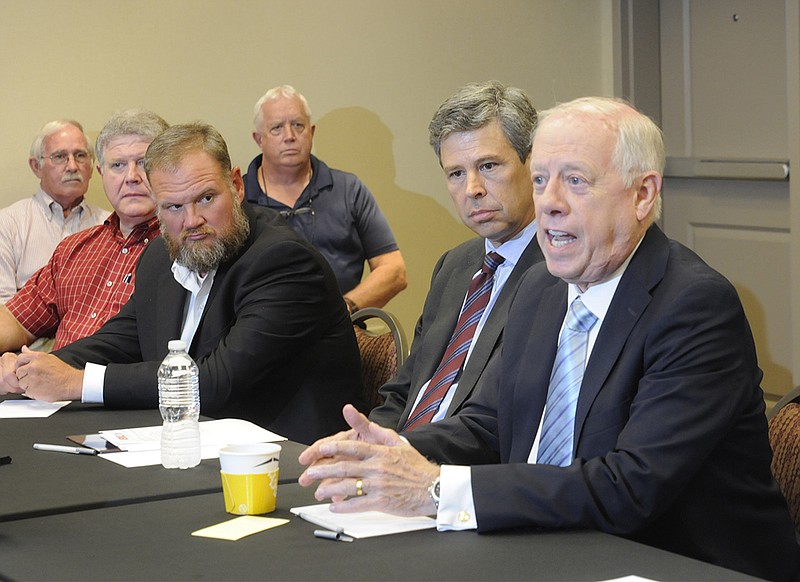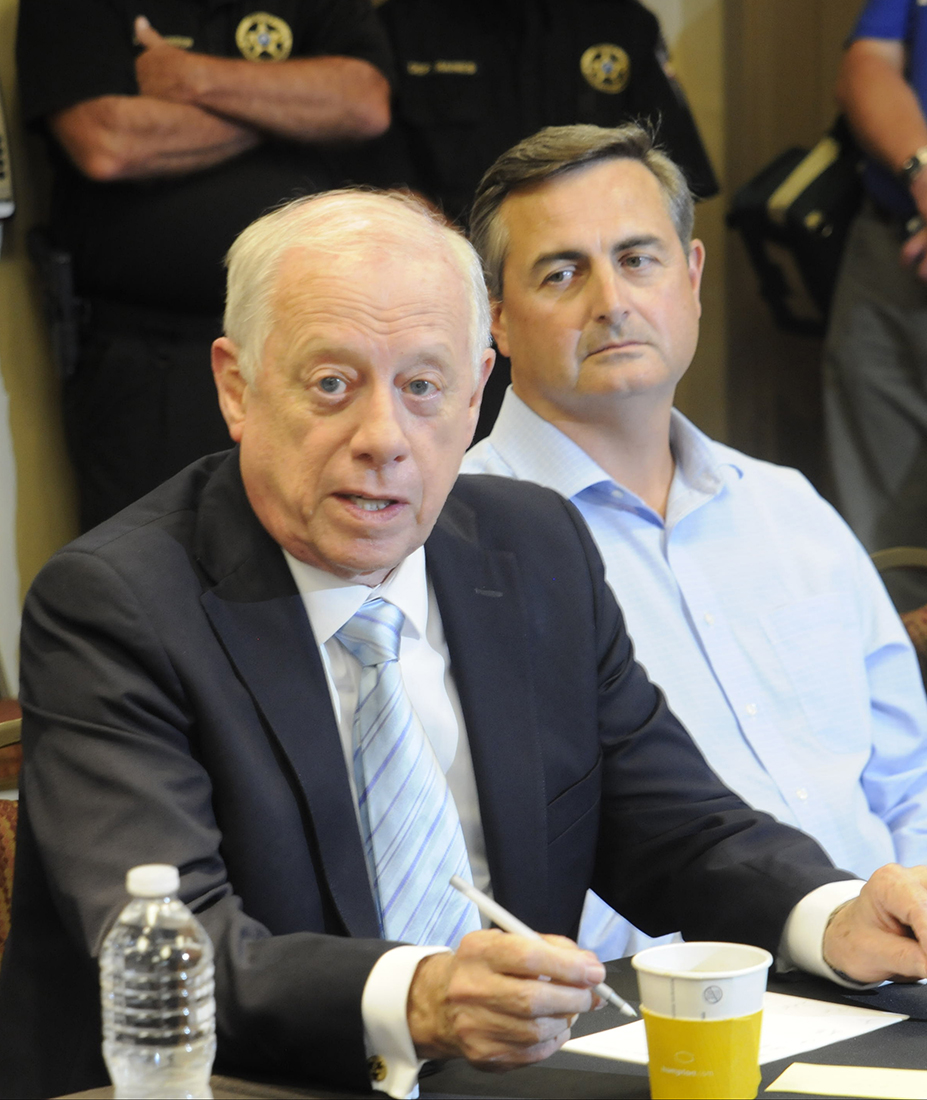KIMBALL, Tenn. - Nearly a century after the Tennessee Valley Authority was created to help bring electricity to an impoverished rural Appalachia, a former Tennessee governor wants TVA to help extend high-speed internet service into underserved rural parts of TVA's seven-state region.
Phil Bredesen, a Nashville Democrat who is running for Tennessee's open U.S. senate seat, said Friday that America "needs to take on big and bold ideas" and TVA is an ideal instrument for tackling the challenge of bringing high-speed digital connections to remote areas of Tennessee.
"TVA seems to be the perfect vehicle to do this," Bredesen told Sequachee Valley business and government leaders during a roundtable discussion here Friday. "TVA's DNA when it was created in the 1930s was to be all about rural development, and TVA is also big enough and has the technical and managerial expertise to pull off a complicated task such as this."
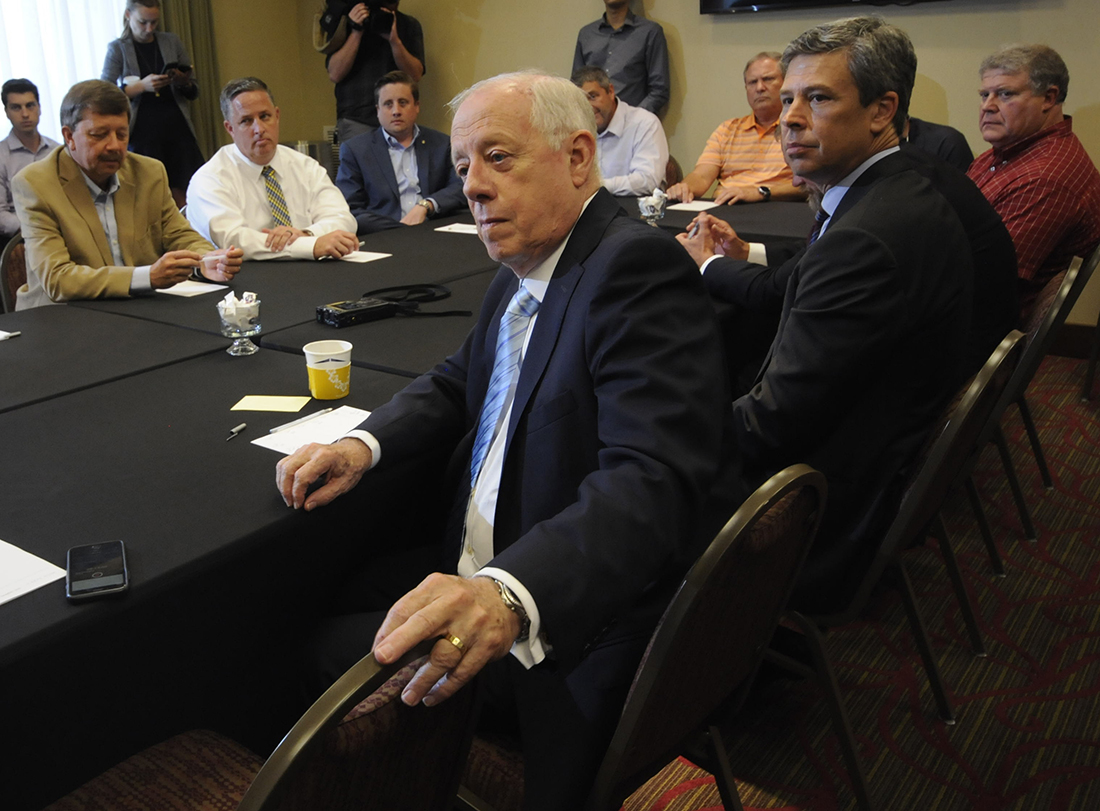 Former Tennessee Governor, and U.S. Senate candidate, Phil Bredesen, listens during a roundtable discussion with Sequatchie Valley leaders about broadband access. Chattanooga Mayor Andy Berke sits alongside. Marion County General Sessions Judge Mark Raines listens, far right. The group met at the Hampton Inn in Kimball. / Staff photo by Tim Barber
Former Tennessee Governor, and U.S. Senate candidate, Phil Bredesen, listens during a roundtable discussion with Sequatchie Valley leaders about broadband access. Chattanooga Mayor Andy Berke sits alongside. Marion County General Sessions Judge Mark Raines listens, far right. The group met at the Hampton Inn in Kimball. / Staff photo by Tim Barber
Although most Tennesseans now have access to broadband service (defined by the Federal Communications Commission as a download internet speed of at least 25 megabits per second), less than half of people in Meigs, Sequatchie and six other Tennessee counties have such connections and most rural counties have at least some remote areas with spotty or no internet coverage.
The FCC's universal access fund and Tennessee's broadband expansion law pushed by Gov. Bill Haslam are helping to expand broadband coverage with federal grants and distributed fees, but Bredesen contends those programs "don't even begin to touch the problem."
The Tennessee Broadband Accessibility Act approved by the Tennessee legislature last year allows electric cooperatives to form partnerships to provide broadband service and allocates $45 million over three years in grants and tax credits to induce broadband providers to make broadband available to unserved homes and businesses.
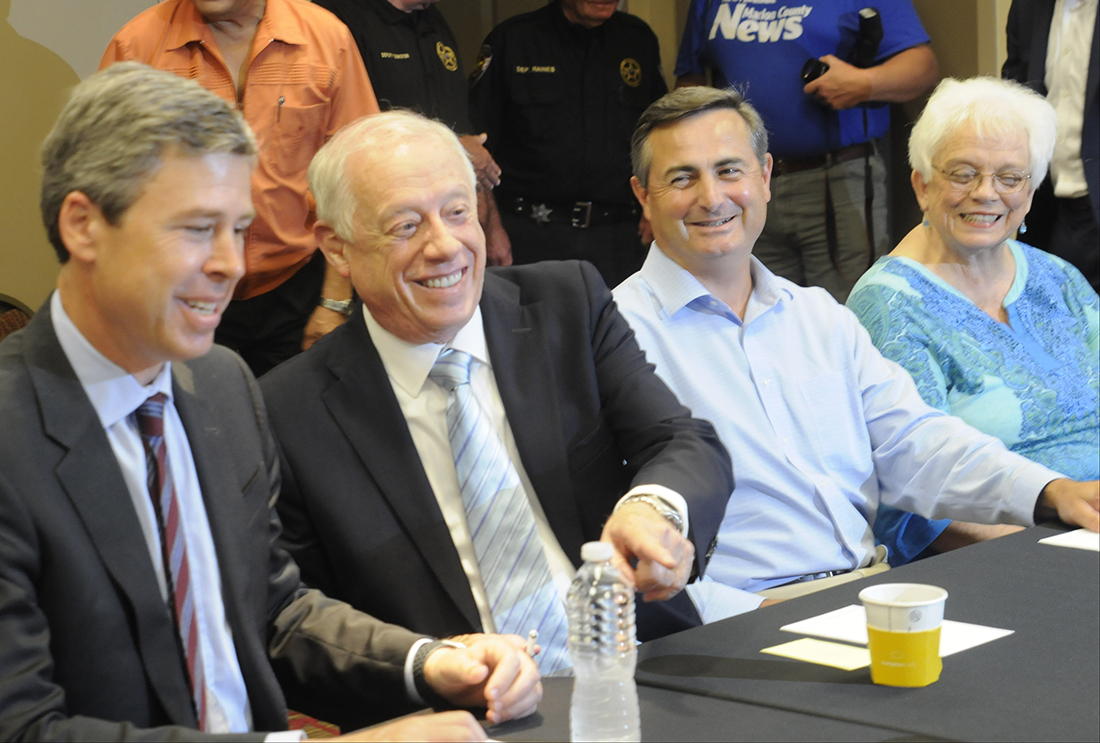 Chattanooga Mayor Andy Berke, left, enjoys a moment with former Tennessee Governor Phil Bredesen during a roundtable discussion with Sequatchie Valley leaders about broadband access. Sequachee Valley Electric Coop President Mike Partin and Whitwell Mayor Linda Hooper join the light hearted moment. The group met at the Hampton Inn in Kimball. / Staff photo by Tim Barber
Chattanooga Mayor Andy Berke, left, enjoys a moment with former Tennessee Governor Phil Bredesen during a roundtable discussion with Sequatchie Valley leaders about broadband access. Sequachee Valley Electric Coop President Mike Partin and Whitwell Mayor Linda Hooper join the light hearted moment. The group met at the Hampton Inn in Kimball. / Staff photo by Tim Barber
Bredesen's opponent in the U.S. Senate race, U.S. Rep. Marsha Blackburn, said Tennessee needs to focus on implementing that measure and encouraging more players in the market, rather than promoting a government monopoly with an unknown cost to the taxpayer.
"We cannot turn broadband expansion over to the government, " said Blackburn, who had her own listening session Friday in Oak Ridge with people interested in broadband issues. "Doing so would create a monopoly and raise taxes, all while drawing the process out."
Blackburn, who is chairwoman of the House Subcommittee on Communications and Technology, said Tennessee has "already made great progress in closing the digital divide." In addition to Haslam's broadband expansion measure adopted last year, Blackburn has helped support federal legislation to lessen the rules and regulations on business and to put $600 million in federal grants into the rural utility service to aid in broadband service in remote areas.
Technologies like satellite and fixed wireless need spectrum to deliver broadband service to customers and Blackburn has supported measures to reallocate the commercial spectrum "so broadband providers have the tools they need to provide access to as many people as possible."
"Government must get out of the way and limit burdensome regulatory barriers that make private investment cost prohibitive," Blackburn said.
A new mission for TVA?
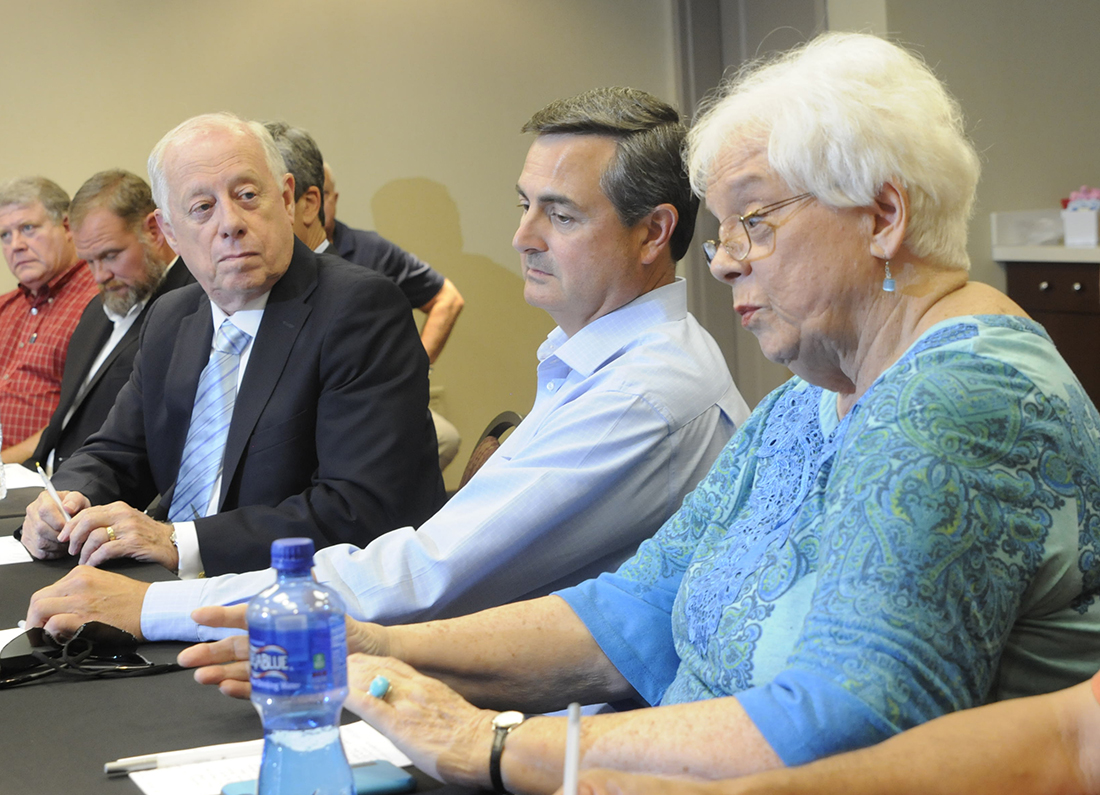 Mayor of Whitwell Linda Hooper, right, makes a verbal yes heard for broadband as former Tennessee Governor, and U.S. Senate candidate, Phil Bredesen, listens during a roundtable discussion with Sequatchie Valley leaders about broadband access. Seated between the two is Mike Partin, president of the Sequachee Valley Electric Coop. The group met Friday at the Hampton Inn in Kimball. / Staff photo by Tim Barber
Mayor of Whitwell Linda Hooper, right, makes a verbal yes heard for broadband as former Tennessee Governor, and U.S. Senate candidate, Phil Bredesen, listens during a roundtable discussion with Sequatchie Valley leaders about broadband access. Seated between the two is Mike Partin, president of the Sequachee Valley Electric Coop. The group met Friday at the Hampton Inn in Kimball. / Staff photo by Tim Barber
In the 1930s, TVA extended electricity service across the Tennessee Valley and lowered power rates by harnessing the power of the Tennessee River and taking over existing private power companies in the Valley, including the Tennessee Electric Power Co. (TEPCO) in Chattanooga. TVA received federal funding support for such initiatives in its early days, although the federal utility is now self-funded and has repaid the U.S. treasury for its initial funding.
Bredesen said he is open to again trying to provide federal funding for TVA to undertake a mission of rural broadband expansion, but he said he isn't sure yet of its costs.
He also said the proposed changes he would back in the TVA Act to allow the utility to broaden its mission would not be designed to drive any private telecom providers out of the market.
"There are opportunities for public and private partnerships and I think we can get it done," he said.
Bredesen said he has talked privately with people at TVA, who under the federal Hatch Act are precluded from engaging in political debates in their official roles. But Bredesen said giving TVA a new mission would help enhance the agency with a new purpose, make it more than just another power utility, and help ensure its future.
Last year, TVA launched a $300 million expansion of its fiber optic network to improve its power controls and operations along its 16,000 miles of transmission lines and connections to the 155 local power companies that distribute TVA-generated power. TVA said it is building more fiber than it now needs for its own power operations so some fiber may be available for other uses.
But TVA President Bill Johnson said earlier this month the utility "is not intending and has not asked to go into anything other than the backbone of our network.
"We think that is the space we need to be in, and what happens after that we'll leave to others," Johnson said.
Political dispute over digital divide
TVA's future could now play out in the closely watched U.S. Senate race in Tennessee, which polls show to be a close race between Bredesen and Blackburn.
Bredesen, the last Democrat elected statewide in Tennessee when he won all 95 counties in his 2006 re-election, calls himself a "pragmatic problem solver" and says TVA could help address the vexing challenge of how to provide broadband coverage in rural areas of Tennessee. The former Tennessee governor likened the effort to the federal government establishing mail delivery everywhere in the 19th century and promoting universal power and telephone service during the 20th century.
"Having high-speed internet today is essential for individuals and communities to compete and we need to do more to ensure everyone has access to that service, " he said.
But Blackburn, a strong Trump supporter in a state where the president won by a 26-point margin two years ago, insists that big government is not the solution to broadband coverage.
"We need to create a business friendly environment that encourages competition, as opposed to one that suppresses it." she said. "My campaign is focused on free market solutions and is why I've been endorsed by the U.S. Chamber of Commerce."
Dr. John Greer, a professor of political science at Vanderbilt University, said Tennesseans are generally wary of "big government solutions." But TVA is usually seen more favorably due to its success in helping electrify the region and boost average incomes.
"The problem is that there is not a lot of profit for private business serving a small number of people in rural areas with broadband," Greer said. "How you address that challenge is certainly the start of an issue the candidates are disagreeing about."
Bredesen supporters, including Chattanooga Mayor Andy Berke who served in the state Senate when Bredesen was governor, said Friday they see Bredesen's approach as a pragmatic plan to provide an increasingly essential service. But Greer said Blackburn and her supporters may try to use Bredesen's support for expanding TVA's role to paint the former governor as a supporter of more government solutions and taxpayer spending.
During Friday's roundtable discussion here, Bredesen got lots of support from local business, labor and political leaders eager to enhance local broadband connections in the shadow of Chattanooga's "Gig City" service, the fastest in the United States.
"You can't do hardly anything today without having access to good, steady internet service, and I think providing that needs to be a public project and we need to get on with it," said Linda Hooper, mayor of Whitwell and a member of the Marion County school board. "Everybody seems to want to stand back and argue with one another about everything. Let's get a vision, and I think Phil Bredesen has that vision for getting broadband internet service to every citizen in Tennessee."
Marshal "Mark" Raines, a General Sessions Court judge in Marion County who lives in Whiteside, said he enjoys EPB service. But he fears some other areas will not be served anytime soon if they have to rely upon investor owned companies extending their lines to remote areas.
'I think there are areas of the country, if you don't do something, they'll never see high-speed broadband," he said.
Marion County Superintendent Mark Griffith estimates nearly half of the 4,300 students in Marion County public schools lack any high-speed internet connections at home, forcing many students to leave home to do their homework,
"Our kids shouldn't have to go to Krystal or McDonald's just to do their homework," said Mike Partin, president of the Sequachee Valley Electric Cooperative.
Contact Dave Flessner at dflessner@timesfreepress.com or at 757-6340.
